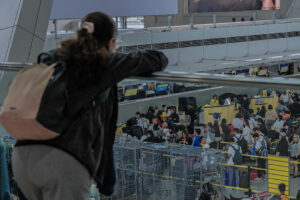By Ashley Erika O. Jose, Reporter
THE CIVIL Aeronautics Board (CAB) is set to meet with local carriers on Friday (Oct. 18) to discuss the airlines’ proposal to collect terminal enhancement fees from passengers amid the rising cost of using the Ninoy Aquino International Airport (NAIA).
Manila International Airport Authority (MIAA) General Manager Eric Jose C. Ines said the CAB is currently studying the proposal of three airlines to collect these additional fees from passengers.
“The deliberation is ongoing, the CAB will look into it immediately,” Mr. Ines said by phone on Wednesday.
“MIAA’s part is just consultative, we will meet with CAB and the three local carriers on Friday so that they can justify their reasons,” he added.
MIAA, which has transitioned to its sole regulatory function for NAIA, serves as a consultative body for the proposed collection of terminal enhancement fees, Mr. Ines said.
The local airlines are reportedly seeking an average P300 per flight to cover the higher cost of operating at NAIA.
Aside from the three local carriers: Philippine Airlines operated by PAL Holdings, Inc.; Cebu Pacific operated by Cebu Air, Inc.; and Philippines AirAsia, Inc. (AirAsia Philippines), Mr. Ines said other foreign carriers operating at NAIA may also seek the same relief.
“I think the airlines anticipated that the moment NNIC (New NAIA Infra Corp.) took over there would be an increase in fees. To cover up for that expense, they filed this. It is still under request, whether it will be approved or not, it is being evaluated by CAB,” Mr. Ines said, noting that the petition was filed in September.
NNIC, the new operator of the Ninoy Aquino International Airport (NAIA), took over the operations and maintenance of the country’s main gateway on Sept. 14. Landing and take-off fees, a charge collected from airlines for using airport facilities and services, were increased starting this month.
A higher passenger service charge is also scheduled to be implemented by September 2025.
Enrico P. Villanueva, a senior lecturer at the University of the Philippines Los Baños Economics Department, said airline companies are expected to pass on additional charges to passengers.
“As a business, airlines have to pass on extra charges at terminals. It is a misnomer to call the fee enhancement, if the latter has not yet happened,” Rene S. Santiago, former president of the Transportation Science Society of the Philippines, said in a Viber message.
“The first order of the day should be for the Transport department and the MIAA to ask the new operator for a comprehensive list of the new airport fees that it seeks to implement on passengers and other airport stakeholders,” said Terry L. Ridon, a public investment analyst and convenor of think tank InfraWatch PH.
Nigel Paul C. Villarete, a senior adviser on public-private partnership (PPP) at the technical advisory group Libra Konsult, Inc., said the proposed terminal enhancement fees are justified since the new operator of NAIA is set to implement enhancements at the airport.
“These will be incorporated in their set fares which they can adjust anytime anyway so they may simply adjust the airport fees accordingly,” Mr. Villarete said in a Viber message.
AirportWatch Philippines Spokesperson Danilo Lorenzo S. Delos Santos called the higher fees imposed by NNIC as unreasonable and premature because no improvements yet have been implemented at NAIA.
“Clearly, these airport fee increases by Administrative Order 1 are unjustified because these are imposed on the public long before any impact from the rehabilitation efforts are felt by everyone,” Mr. Lorenzo said.
To recall, NNIC explained earlier that all fee increases implemented are only in accordance with the parameters and financial terms set by the Transportation department, MIAA, and its project transaction advisor Asian Development Bank during the bidding of the NAIA PPP partnership (PPP) project.


















